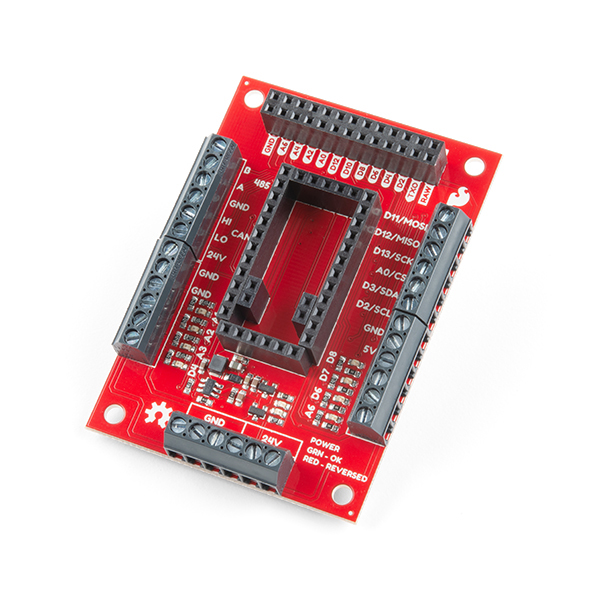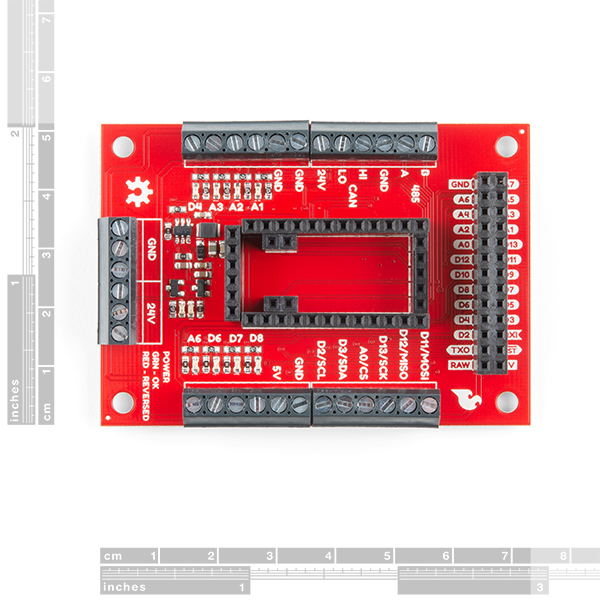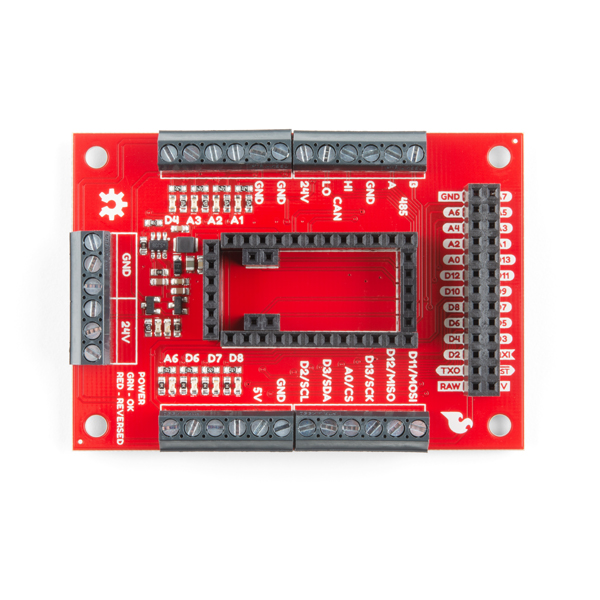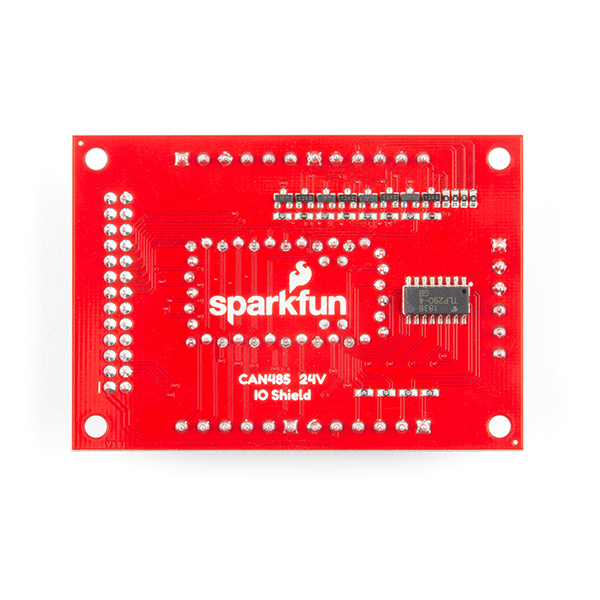SparkFun AST-CAN485 I/O Shield (24V)
The SparkFun AST-CAN485 I/O Shield allows you to use the AST-CAN485 Dev Board with 24VDC Inputs and Outputs, a popular voltage level for industrial automation devices as well as 5v devices. By providing screw terminals, the board can easily and safely interface with I/O in a semi-permanent manner which allows for inputs, outputs, or the board itself to be swapped out. With all pins pre-populated with either females pin headers or screw terminals, setup time is minimized.
The AST-CAN485 I/O Shield provides a socket to break out all of the I/O of the AST-CAN485 Dev Board. To make a secure connection to your industrial equipment, screw terminals come pre-soldered to the board to get you up and running in no time. The AST-CAN485 I/O Shield is designed to work in the industrial 24V environment, but has a wide supply input range of 7-24V. The board comes with input reverse voltage protection with a green and red status LEDs (green means power is connected properly, and red indicates reversed power, and blocks power to the rest of the board.
Note: This board has pins that operate at 24V as well as pins that operate at 5V. Care should be taken during wiring as 24V has the potential to do significant damage to 5V circuits.
- Toshiba TLP290-4 Logic Controller
- I/O and Power Pins broken out into both Female Headers and Screw Terminals
- Fully Populated, no soldering necessary
- 7-24VDC Input
- Schematic
- Eagle Files
- Hookup Guide
- CAN Bus
- CAN bus
- CAN 2.0 Specification (superseded by the ISO standard)
- ISO Standard
- CANopen
- DeviceNet
- RS485
- Arduino Board Manager
- Arduino Library
- GitHub
SparkFun AST-CAN485 I/O Shield (24V) Product Help and Resources
AST-CAN485 Hookup Guide
March 1, 2018
The AST CAN485 is a miniature Arduino in the compact form factor of the ProMini. In addition to all the usual features it has on-board CAN and RS485 ports enabling quick and easy interfacing to a multitude of industrial devices.
AST-CAN485 I/O Shield (24V) Hookup Guide
February 14, 2019
The AST-CAN485 I/O Shield is an Arduino shield that will allow the user to interface the AST-CAN485 Dev Board with 24V inputs and outputs, which expands its usefulness into industrial systems.
Core Skill: DIY
Whether it's for assembling a kit, hacking an enclosure, or creating your own parts; the DIY skill is all about knowing how to use tools and the techniques associated with them.
Skill Level: Noob - Basic assembly is required. You may need to provide your own basic tools like a screwdriver, hammer or scissors. Power tools or custom parts are not required. Instructions will be included and easy to follow. Sewing may be required, but only with included patterns.
See all skill levels
Core Skill: Programming
If a board needs code or communicates somehow, you're going to need to know how to program or interface with it. The programming skill is all about communication and code.
Skill Level: Rookie - You will need a better fundamental understand of what code is, and how it works. You will be using beginner-level software and development tools like Arduino. You will be dealing directly with code, but numerous examples and libraries are available. Sensors or shields will communicate with serial or TTL.
See all skill levels
Core Skill: Electrical Prototyping
If it requires power, you need to know how much, what all the pins do, and how to hook it up. You may need to reference datasheets, schematics, and know the ins and outs of electronics.
Skill Level: Competent - You will be required to reference a datasheet or schematic to know how to use a component. Your knowledge of a datasheet will only require basic features like power requirements, pinouts, or communications type. Also, you may need a power supply that?s greater than 12V or more than 1A worth of current.
See all skill levels
Comments
Looking for answers to technical questions?
We welcome your comments and suggestions below. However, if you are looking for solutions to technical questions please see our Technical Assistance page.
Customer Reviews
No reviews yet.





Hi, can i plug in ardino pro mini for use only I/O 24V and suply 5V to arduino?
The schematic only has one page. I think the other page is missing.
Fixed, thanks for the heads up.